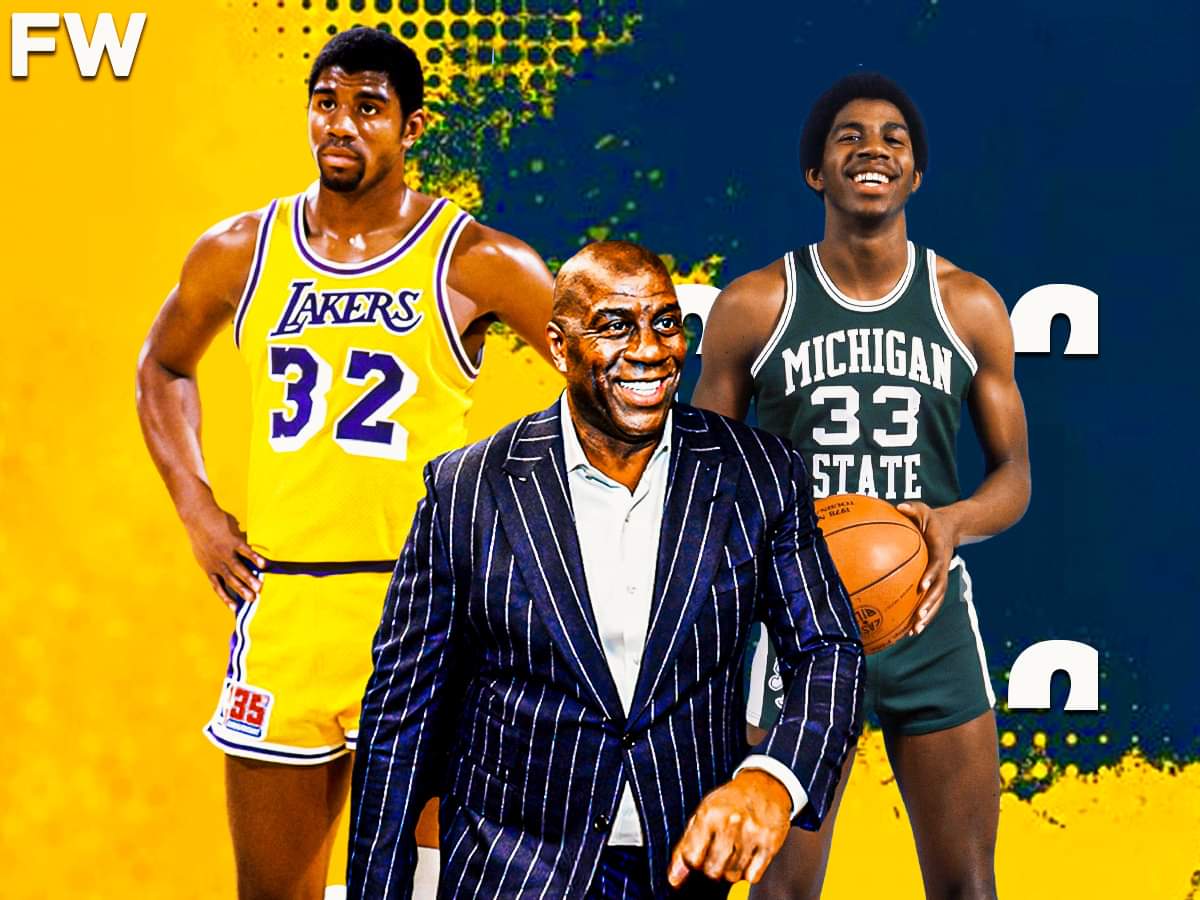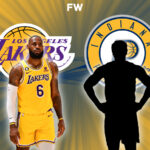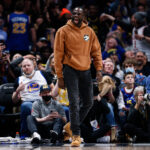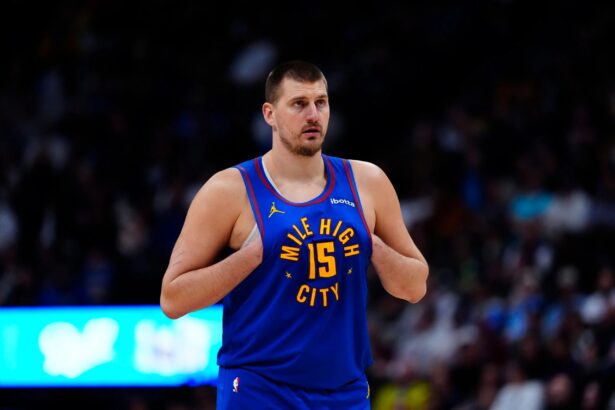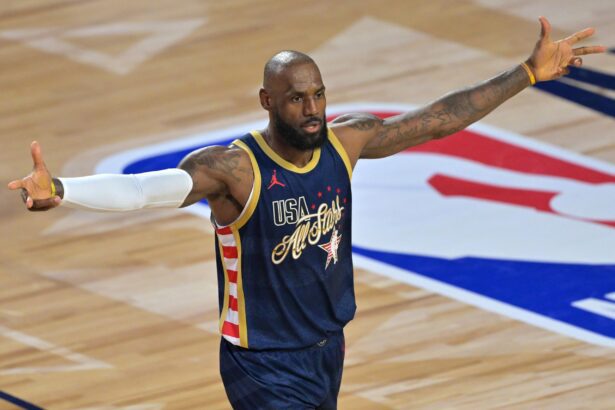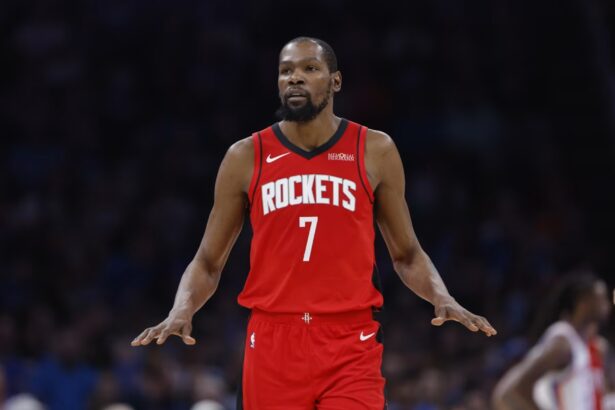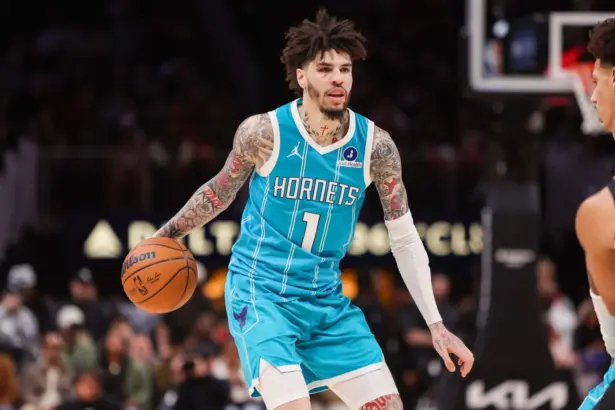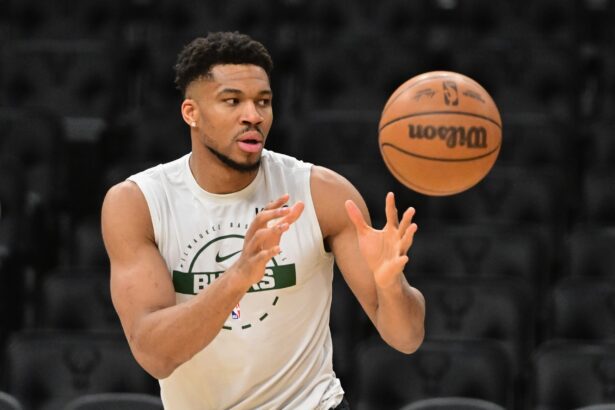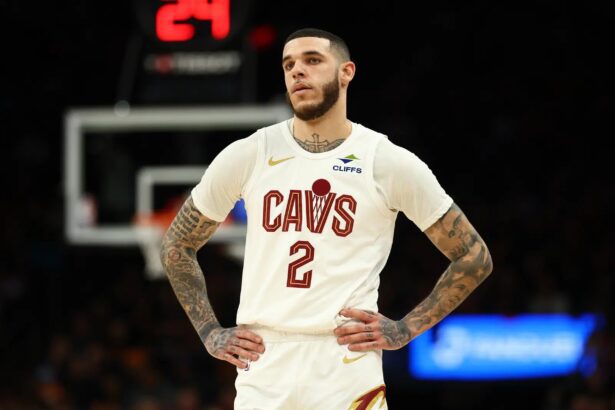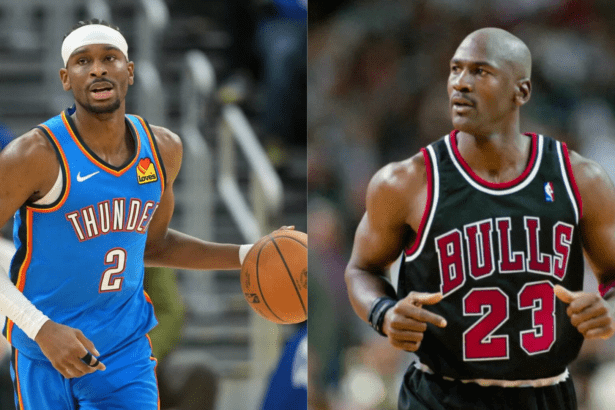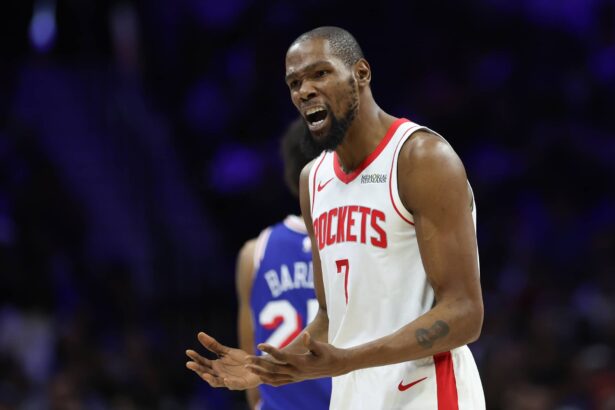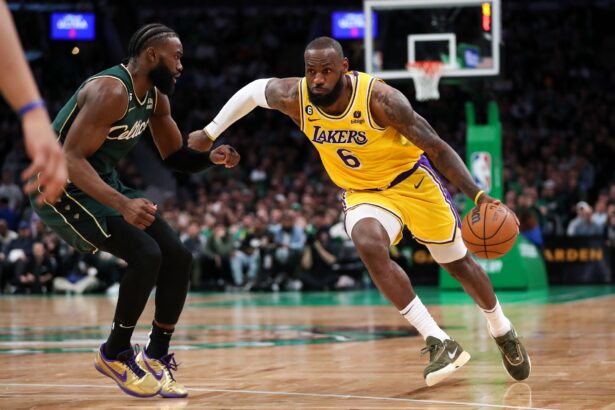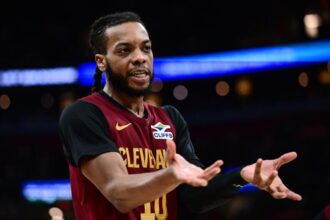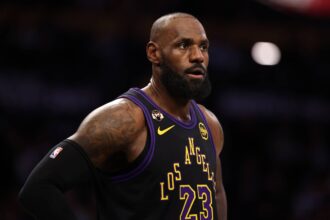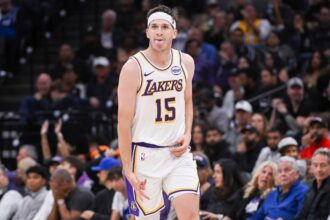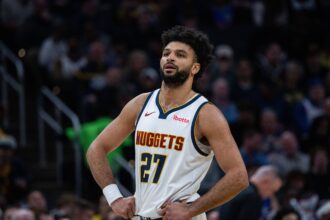The NBA was on the brink of collapse in the late 1970s. Most people couldn’t care less about the game of basketball, as baseball and football ruled American sports.
Then, two college players entered the NBA in the 1979-80 season and changed history forever. The players were Larry Bird, who was drafted sixth overall in the 1978 Draft but returned to college for one more year.
This decision by Bird set up the greatest NCAA championship game of all time. The second player was Magic Johnson, who was the first overall pick in the 1979 NBA Draft.
Both Bird and Magic capitulated audiences, not only with their incredible individual play but the rivalry these two created between themselves and their two teams. Still, no matter how great Larry Bird was, Magic Johnson was one step ahead of him.
In today’s article, we’re going to focus on Magic Johnson, who is arguably the greatest point guard in NBA history. His life is full of ups and downs, and we’re going to dive deep into all of it.
Here is the biography of Earvin “Magic” Johnson Jr.
Earvin Johnson Jr. Becomes Magic
On August 14, 1959, Earvin Johnson Sr. and Christine Johnson gave birth to a son which they named Earvin Johnson Jr. The family lived in Lansing, Michigan, and was a family that didn’t have much, but they worked hard.
Earvin Sr. Worked in a General Motors plant, while Christine worked as a school custodian. Their hard work would rub off on Magic, and he’d take this through his eventual career of becoming a professional basketball player.
Before Magic would play professional basketball, he had to develop his game, which he’d do thanks to his hard-working parents. Earvin Sr. played basketball in high school when he was younger, and Christine grew up playing basketball with her brothers.
So, Magic certainly had a lot of experience with basketball growing up. By the time Magic was in the eighth grade, he was already proving to everyone that a future in basketball might be achievable.
Magic once scored 48 points in junior high basketball, and he couldn’t wait to play basketball at Sexton High School, the high school near his home. Right before Magic entered high school, he learned he’d have to go to Everett High School, a predominantly white school.
There, Magic would deal with racism in school and on the basketball team. The white players didn’t want to pass Magic the ball at times, which led to Magic standing up for himself and demanding the ball.
This action by Magic not only had the other Black students looking up to him, but it led to the white players finally involving Magic in the team’s plans. Magic would quickly show his teammates, his coach, and everyone else in the school that he could be the one to lead the school’s basketball to greatness.
At the age of 15, a sophomore, Earvin Johnson Jr. dominated the competition so badly, with his fancy passes, that a reporter with the Lansing State Journal named Fred Stabley Jr. gave Earvin the “Magic” nickname we all know him as today.
Magic even answered this question in a tweet back in 2011:
The correct answer was Fred Stabley, Jr. at 15.
— Earvin Magic Johnson (@MagicJohnson) October 13, 2011
Magic led his high school to a state championship in his senior year. His high school career ended with him earning two All-State selections and a selection to the 1977 McDonald’s All-American team.
Magic Dominates College And Becomes Number 1 Pick In NBA Draft
Magic would decide to stay close to home and attend Michigan State, despite receiving offers from big schools like UCLA and Indiana. This choice would work out for Magic, as he wanted to play the point guard position.
Michigan State’s head coach, Jud Heathcote, agreed to let Magic play point guard, and this decision would lead to great things. As a freshman, Magic averaged 17.0 points, 7.9 rebounds, and 7.4 assists, while leading Michigan State to a 25–5 record and a trip to the Elite Eight.
This was a great season for Magic, but things would get better for him. The following year, Magic averaged 17.1 points, 7.3 rebounds, and 8.4 assists per game.
This time, Magic led Michigan State to a 26-6 record, but their time in the NCAA Tournament would be different. Magic led Michigan State to the championship game against Indiana State, who was led by Larry Bird.
This game became the most-watched college basketball game, and it didn’t disappoint. Magic and Bird seemingly went after each other on the court, which was a preview of things to come in the NBA.
At the end of the game, Magic’s squad left victorious, winning 75–64 over Bird’s team. Magic scored 24 points, grabbed 7 rebounds, and dished out 5 assists, which led to him being named the Most Outstanding Player of the Final Four.
Magic was named to the 1978–79 All-American team after the season, and the NBA Draft was calling his name, as he was projected to go first if he left school early. It is probably obvious that Magic planned to go to the NBA during his time in college, but this was actually false.
Magic didn’t plan on playing professional basketball. In fact, he was focusing on his communication studies major, which he attended to become a television commentator. Magic would one day work as a commentator for the NBA, but first, a professional playing career was calling his name.
The Magic Man Takes Over The NBA As A Rookie
Magic Johnson was selected first in the 1979 NBA Draft. He was selected by the Los Angeles Lakers, who had the great Kareem Abdul-Jabbar. Despite the greatness of Kareem, the Lakers were a poor team. They needed a spark, and Magic would be that spark.
As a rookie, Magic was dominant. He pushed the pace of the Lakers’ offense in a way they hadn’t seen before. The Lakers won 47 games the year prior to Magic’s arrival, they won 60 games during Magic’s rookie season.
You would think there would be no question who the Rookie of the Year was. Magic averaged 18.0 points, 7.7 rebounds, 7.3 assists, and 2.4 steals per game. Still, this wouldn’t be enough to win the award.
In fact, Magic only earned 3.0 votes for the Rookie of the Year award, while the winner earned 63.0 votes. Who beat Magic for the Rookie of the Year award? Larry Bird.
The Magic and Bird rivalry was somewhat renewed, but Magic would get the last laugh. While Bird’s Boston Celtics were eliminated in the NBA Eastern Conference Finals by the Philadelphia 76ers, Magic led his Lakers to the NBA Finals.
The NBA Finals would become Magic’s place to shine and show everyone how good of a player he really was. Lakers star, Kareem Abdul-Jabbar, was having an incredible series through the first four games.
Kareem scored 33, 38, 33, and 23 points in those first four games. Then, in Game 5, Kareem suffered a severely sprained ankle halfway through the game. Now, Kareem would return, and he had a monster game, scoring 40 points and grabbing 15 rebounds.
The problem was after the game, Kareem lost that adrenaline rush that helped him finish the game, and he was ruled out for Game 6. Without Kareem, the Lakers appeared to have no chance.
Magic Johnson disagreed with this notion, as he believed the Lakers had a great chance. He started the game at the center position for Kareem, jumping for the opening tip of the game.
Magic would go out and have the greatest NBA Finals game by a rookie. He scored 42 points on 14-23 shooting. Magic also grabbed 15 rebounds while handing out 7 assists.
The Lakers won 123-107 over the 76ers, winning the NBA championship. Magic was named the Finals MVP for his Game 6 performance.
https://www.youtube.com/watch?v=H906s1BZu-Y
It’s not often that rookies become champions, and only Magic has won the Finals MVP award. Still, this wouldn’t be the last time that Magic won a championship or Finals MVP.
Yes, Magic would rule the 1980s, and he’d set up a rivalry that’s still considered the greatest in NBA history, while, along with Bird, would help bring the NBA back from near collapse to one of the most popular sports in the world.
The Magical Dynasty Of The Lakers
The Lakers won the championship in 1980, then shockingly lost in the first round the next season to the Houston Rockets. The Rockets would go on to the Finals to lose to the Larry Bird-led Boston Celtics.
The Lakers would get back to the Finals in the 80s with Magic in 1982, 1983, 1984, 1985, 1987, 1988, and 1989. Los Angeles won the title in 1982, 1985, 1987, and 1988.
In all of those Finals appearances, Magic would face off against his rival, Larry Bird, in 1984, 1985, and 1987. The 1984 Finals would be particularly fought for Magic, as he choked in a few big moments.
With seven seconds remaining in Game 2, the score was tied 113-113, and the Lakers were looking to take a 2-0 series lead. Magic had the ball, and you’d expect him to make a play in crunch time, yet, this did not happen.
Magic dribbled the ball as time expired on the clock, and Magic had the ball. Did he dribble and attack the paint? A behind-the-back pass? An alley-oop to Kareem? None of the above. Magic dribbled the clock away, only passing once the buzzer sounded.
Things would get worse in Game 4. The Lakers led 2-1 in the series and held a five-point lead with less than a minute to go in the fourth quarter.
First, Magic committed a turnover. Then he missed two free throws in overtime with 34 seconds remaining. The Lakers lost 129-125 in Game 4, and they’d lose the series in seven games.
After the series, Celtics fans started to call Magic “Tragic Johnson.” The mainstream media caught wind of it, and they also dubbed him “Tragic Magic.”
Despite this tragic event, Magic would bounce back against his rival in the 1987 NBA Finals. Magic led the Lakers to the title over the Celtics in six games.
Magic won the Finals MVP by averaging 26.2 points, 8.0 rebounds, and 13.0 assists per game. This performance was great, but the best moment from Magic came in Game 4.
The Lakers trailed 106-105 with seven seconds remaining in the game. All eyes were on Magic. Would he be tragic once again? Of course not; Earvin would sprinkle a little magic on the Celtics.
Magic hit the now-famous “baby hook” shot to beat Larry Bird and the Celtics. There was no more tragic for Magic. At least there wouldn’t be until 1991. Then, the real tragic moment of Magic Johnson’s life would occur.
Magic Johnson’s Shocking Illness And Retirement
Magic Johnson’s last championship win was in 1988, but he did manage to get back to the NBA Finals when his Lakers took on the Chicago Bulls, led by Michael Jordan. Even though Magic played well in the series (18.6 points, 8.0 rebounds, 12.4 assists), Magic’s Lakers lost in five games.
Magic was looking to bounce back in the 1991-92 season, yet tragedy would strike his life and the NBA community as a whole. On November 7, 1991, Magic held a press conference to announce he would be retiring from the NBA because he contracted HIV.
“Because of the HIV virus that I have attained, I will have to retire from the Lakers. Today. I just want to make clear, first of all, that I do not have the AIDS disease — ’cause I know a lot of you are — want to know that — but the HIV virus.
“My wife is fine. She’s negative, so there’s no problem with her. I plan on going on, living for a long time, bugging you guys, like I’ve [sic] always have. So, you’ll see me around. I plan on being with the Lakers and the league — Hopefully, David [Stern] will have me for a while — and going on with my life.
“And I guess now I get to enjoy some of the other sides of living… that because of the season, the long practices and so on. I just want to say that I’m going to miss playing. And I will now become a spokesman for the HIV virus because I want people — young people to realize that they can practice safe sex.
“And you know sometimes you’re a little naive about it and you think it could never happen to you. You only thought it could happen to, you know, other people and so on and all. And it has happened, but I’m going to deal with it and my life will go on. And I will be here, enjoying the Laker games, and all the other NBA games around the country. So, life is going to go on for me, and I’m going to be a happy man.”
Magic did retire, but he wouldn’t stay out of the game for long. He would return first to play in the 1992 NBA All-Star Game, thanks to the fans voting him in. In his return, Magic put on a show, scoring 25 points while handing out 9 assists.
Magic hit a three-pointer over Isiah Thomas with about 14 seconds remaining. The game was called, as the West was destroying the East, 153-113.
After the 1991-92 season, USA basketball was selecting their roster for the Olympics, and Magic was chosen to be a part of the Dream Team. Team USA dominated the competition, winning the gold medal with an 8–0 record. They beat their opponents by an average of 43.8 points per game.
Magic averaged 8.0 points per game during the Olympics, and his 5.5 assists per game were second on the team behind Chicago Bulls forward Scottie Pippen.
Magic attempted a comeback in the 1992-93 season, but his comeback didn’t happen. The main reason he ended his comeback was that other players in the league voiced their concern about playing alongside Magic, in fear they would too be infected with the virus.
Magic would not play, but he would stay connected to the game. He first worked as a color commentator for NBC, calling NBA games. Then, in 1993-94, Magic began his coaching career for the Lakers when he replaced the fired Coach Randy Pfund and Bill Bertka, who served as an interim coach for two games.
Magic’s coaching career would only last 16 games. The Lakers went 5-11 under Magic, and he resigned at the end of the season. After the season, Magic would purchase a 5% share of the Lakers.
Halfway through the 1995–96 season, Magic would make his return to the Lakers. He entered the season at the heaviest weight he’s ever been, at 255 pounds. This was because of his efforts to fight his HIV.
On January 29, 1996, Magic officially announced his return to the NBA, and he’d play his first game the following day against the Golden State Warriors. Magic came off the bench to play 27 minutes and helped the Lakers beat the Warriors 128-118, as Magic put up 19 points, 10 assists, 8 rebounds, and 2 steals.
Magic would retire once again after the season, mainly because some of the other Lakers players believed he was taking away from their games. Still, Magic had a good season, averaging 14.6 points, 6.9 assists, and 5.7 rebounds per game.
In 32 games, Magic led the Lakers to a record of 22–10. Magic also finished tied for 12th place with Charles Barkley in voting for the MVP Award.
After retiring from the NBA for good, Magic attempted one more basketball comeback in the Swedish Basketball League in 1999. Magic became a co-owner and player for M7 Borås, where he only played in five games.
Magic left after one season, and the team folded in bankruptcy, but he returned in 2001 to play for the Danish team, the Great Danes. After two games, Magic would retire, officially ending his playing career.
Magic Johnson, The Executive And Businessman
After walking away from the game of basketball as a player, Magic has become a successful businessman in many different markets. Back in 1997, Magic started Magic Johnson Entertainment, a production company with Fox.
Magic started his own music record label, called Magic 32 Records, in 2000. He started Magic Johnson Enterprises, which is a conglomerate company.
Magic Johnson Enterprises includes Magic Johnson Entertainment, Magic Johnson Theaters, which is a chain of movie theaters, and Magic Johnson Productions, a promotional company.
Magic’s highest achievements in the business world could be his ownership of sports teams. He became a co-owner of the Los Angeles Dodgers in Major League Baseball in 2012. The team won the World Series in 2020.
Magic became a co-owner of the Los Angeles Sparks of the WNBA in 2014. The team won the 2016 WNBA championship.
Magic initially purchased a share of the Lakers in 1994, and he’d keep this stake until 2010. This means Magic won five more titles as a co-owner of the Lakers.
From 2017 to 2019, he served as the Lakers president of basketball operations before he abruptly stepped down during a live press conference.
Besides sports ownership, Magic has been a huge HIV/AIDS activist. In 1991, Magic created the Magic Johnson Foundation, which helps to fight against HIV.
Magic joined the National Commission on AIDS in 1992, whose mission is “promoting the development of a national consensus on policy concerning acquired immune deficiency syndrome [AIDS].”
Magic Johnson has shown that he is a true champion. Not from his incredible five NBA championships as an NBA player or all the championships he has won as an owner of a sports team.
No, Magic Johnson is a champion of life. The way he has never given up, despite contracting a deadly disease, is something for everyone to look up to.
As a fan of sports and life itself, we want to congratulate Magic Johnson on an extraordinary life. We also wish for more great things for Magic in the years to come.
We sincerely appreciate and respect you as a reader of our site. It would help us a lot if you follow us on Google News because of the latest update.
Thanks for following us. We really appreciate your support.

